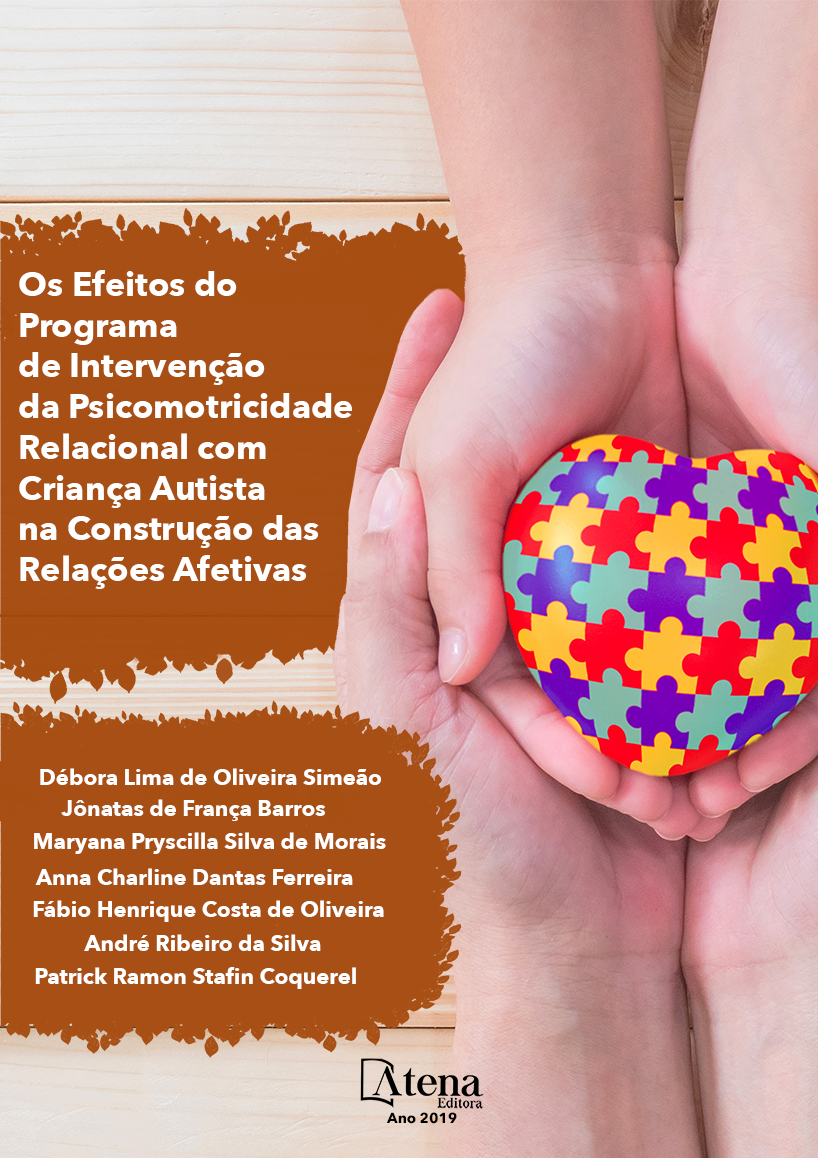
OS EFEITOS DO PROGRAMA DE INTERVENÇÃO DA PSICOMOTRICIDADE RELACIONAL COM CRIANÇA AUTISTA NA CONSTRUÇÃO DAS RELAÇÕES AFETIVAS
As intervenções pedagógicas e terapêuticas com a pessoa autista ganharam espaços
nas discussões acadêmicas, principalmente no campo da promoção da interação
social, além de ser fundamental na mediação de todo processo de aprendizagem.
As pesquisas científicas discutem até que ponto a ausência da interação social, do
contato com o outro, pode interferir no desenvolvimento e formação do indivíduo
com autismo. Esta carência avaliada faz parte do espectro do autismo, e nota-se
que é preciso oportunizar aos indivíduos autistas mecanismos que possibilitem a
superação das dificuldades. Nesta compreensão, a proposta de pesquisa avaliou os
benefícios do programa de intervenção em Psicomotricidade Relacional com criança
autista na faixa etária de 4 anos, atingindo um público da primeira infância ou em
idade pré-escolar, sexo masculino, no aspecto das relações afetivas junto ao objeto, a
relação com o Psicomotricista e seus pares. Na coleta do material bruto da pesquisa,
foram utilizados prontuários com registros da anamnese, constando o registro do
profissional de Psiquiatria, para confirmar o diagnóstico de autismo e seu estágio de
desenvolvimento, critérios de inclusão da pesquisa; utilizando-se como metodologia
a descrição da evolução da criança foco da pesquisa no contato afetivo, por meio
da observação de fotografias e vídeos realizou-se o estudo de caso, fundamentada
na teoria de Lapierre e seguidores, de corte qualitativo com metodologia descritiva.
A pesquisa aconteceu no Centro de Atenção Psicossocial – CAPSi/Natal-RN,
uma instituição com características peculiares, que trabalha com indivíduos com
comprometimento intelectual, patologias mentais e indivíduos autistas, este último
foco da pesquisa, o qual tem o escopo de buscar circunstâncias que podem confirmar
ou ampliar a abordagem da Psicomotricidade Relacional, através da continuidade ou
fomento de pesquisas similares. Os resultados foram encorajadores no campo das
relações afetivas junto ao Psicomotricista. A criança em foco estabeleceu um elo de
comunicação corporal e de confiança, quanto ao objeto verificou-se que a função
relacional teve avanços significativos, o qual permitiu estabelecer o contato com o
adulto e com os pares, e nesta relação observou-se o jogo de imitação, que conduziu
a uma maior aproximação na construção da percepção do outro. Nesta dissertação
nota-se que a abordagem em Psicomotricidade Relacional é um método viável no
trabalho junto às crianças autistas na construção das relações afetivas, e assim,
corroborando com os objetivos propostos.
OS EFEITOS DO PROGRAMA DE INTERVENÇÃO DA PSICOMOTRICIDADE RELACIONAL COM CRIANÇA AUTISTA NA CONSTRUÇÃO DAS RELAÇÕES AFETIVAS
-
DOI: 10.22533/at.ed.273190908
-
Palavras-chave: Psicomotricidade Relacional; Autismo; Relações Afetivas; Objeto, Psicomotricista e pares.
-
Keywords: Relational Psychomotricity; Autism; Affective relations; Object, Psychomotor and peers.
-
Abstract:
The educational and therapeutic interventions with autistic person gained spaces in
academic discussions, especially in the field of promoting social interaction, as well as
being fundamental in the mediation of the learning process. Scientific research discuss
to what extent the lack of social interaction, the contact with the other, can interfere
with the development and training of the individual with autism. This lack evaluated
is part of the autism spectrum, and note that it is necessary to create opportunities to
autistic individuals mechanisms that make it possible to overcome the difficulties. In
this understanding, the proposed study evaluated the benefits of intervention program
in Psychomotor Relational with autistic children aged four years, reaching an audience
of early childhood or pre-school age, male sex, in the aspect of affective relationships
with the object, the relationship with the psychomotor and their peers. In the collection
of the raw material research, medical records were used to history records, stating the
registration of Psychiatry professional to confirm the diagnosis of autism and its stage
of development, research inclusion criteria; using methodology as the description of the
evolution of the child focus of research in the affective contact, through observations of
photographs and videos made the case study, based on Lapierre theory and followers of
qualitative cutting descriptive methodology. The research took place at the Psychosocial
Care Center - CAPSi/Christmas-RN, an institution with peculiar characteristics, which
works with individuals with intellectual, mental disorders and autistic individuals, the
latter focus of research, which has the scope to seek circumstances can confirm or
extend the approach of Psychomotor Relational through continuity or development of
similar research. The results were encouraging in the field of affective relationships
with the psychomotor. The child in focus established a link body communication and
trust, as the object was found that the relational function had significant advances,
which allowed us to establish contact with adults and with peers, and in this respect
there was the game imitation, leading to a closer in building the perception of the
other. In this dissertation we note that the approach Psychomotor Relational is a viable
method in the work of autistic children in the building of personal relationships, and thus
corroborating the proposed objectives.
-
Número de páginas: 15
- Débora Lima de Oliveira Simeão
- Jônatas de França Barros
- Maryana Pryscilla Silva de Morais
- Anna Charline Dantas Ferreira
- Fábio Henrique Costa de Oliveira
- André Ribeiro da Silva
- Patrick Ramon Stafin Coquerel


